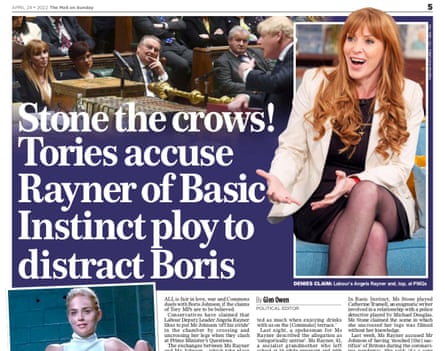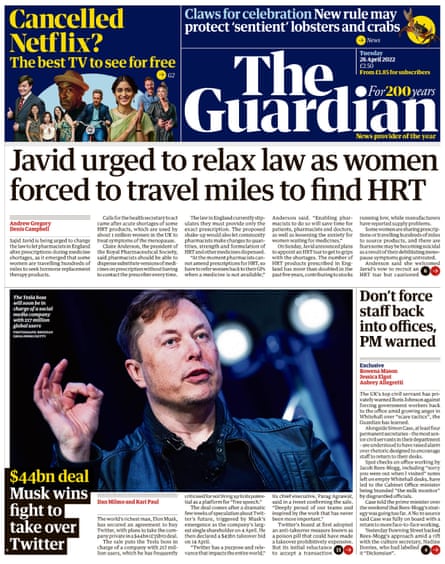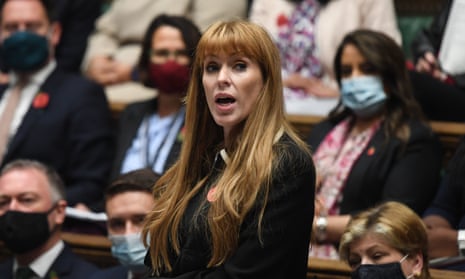Good morning, and welcome to the second First Edition. (We’ll stop counting now, but please do keep sending your incredibly helpful feedback by hitting reply.)
I spent quite a lot of yesterday and this morning trying to think of a more colossally fatuous charge an MP could face than the claim Angela Rayner deployed a “Basic Instinct ploy to distract Boris” in parliament, and, nope, can’t do it. So at least it was pioneering. As Gaby Hinsliff wrote in her column: “This is probably going to shock a lot of people, but Angela Rayner has legs. What’s more… sometimes you can see them”.
As well as breaking new ground in baseless misogynist absurdity, the Mail on Sunday story has now prompted 5,000 complaints. Yesterday the newspaper’s editor was summoned to meet the Speaker of the House of Commons. Conservative whips said they were trying to identify the MoS’s anonymous source, while Boris Johnson said he would unleash “the terrors of the earth” on the MP responsible, just as soon as they tell him who they are.
Gobsmacking though the story is, it’s also absolutely nothing new, as Caroline Davies’ potted history – from ‘Legs-it’ to ‘the great cleavage divide’ to ‘calm down, dear’ – makes clear. For today’s newsletter, Nimo Omer and I spoke to six female politicians about their experiences of misogyny in parliament and the press – each grindingly familiar, each with its own ugly specificity.
First, here are the headlines – and do read on below for a pick of the day’s reads, the front pages, and a bit of good news in the Upside.
Five big stories
Ukraine | Russian foreign minister Sergey Lavrov accused Nato of fighting a proxy war in Ukraine ahead of US-hosted talks in Germany on military aid for Kyiv. For the very latest, head to the live blog.
Twitter | Elon Musk has reached a $44bn deal to buy Twitter in a takeover that will give the world’s richest man control of a social network with more than 200m users. For an expert view sign up for TechScape, Alex Hern’s weekly tech newsletter, which will arrive in your inbox on Wednesday.
Politics | The UK’s top civil servant privately warned Boris Johnson not to force Whitehall staff back to the office, the Guardian reveals. Jacob Rees-Mogg’s campaign against remote working was called “Dickensian” by cabinet colleague Nadine Dorries.
France | Emmanuel Macron is expected to name a new prime minister after his victory in Sunday’s presidential election. Analysts see the minister for work, Élisabeth Borne, as the most likely choice to take the job until June’s parliamentary elections.
HRT | Sajid Javid is being urged to change the law to let pharmacists alter prescriptions during medicine shortages, as it emerged that some women are travelling hundreds of miles to seek hormone replacement therapy products.
In depth: Westminster women on the sexism they face

Caroline Nokes: ‘The Mail on Sunday used a picture of my hold-ups’
“Have I had anything like this? Oh god, yes. Any woman you talk to in politics has fallen victim to this – both the unpleasant, demeaning comments of colleagues, and the way they’re then picked up and run with in the media. Partly because of my age, and partly because I’m chair of the Women and Equalities Committee, I’m treated very differently today to how I was 12 years ago.
“In 2010, the Mail on Sunday used a picture where the tops of the hold-ups I was wearing were visible. The picture was about eight years old – they’d really trawled for it. It was just so belittling. Now I always think very carefully about what I wear.
“I only buy clothes I know will be long enough, and if I’m doing media, I wear trousers, so that nobody gets a shot up my skirt, which I learned from a photo which appeared after I got out of the car to attend my first cabinet meeting. Then there was the article after David Davis mistook Claire Perry for me, and she made a funny retort [referencing his “it’s DD for me” leadership campaign], and it got written up in a way that actually compared our boobs.
“The benches in the House of Commons are uncomfortable, they’re difficult to sit on. And I’m always extremely conscious of how I’m sitting, and not moving around, because of all this. That’s the kind of thing you find yourself having to think about. So, no, the story didn’t surprise me. But it is utterly hideous.”
Caroline Nokes is the Conservative MP for Romsey and Southampton North
Harriet Harman: ‘It’s a disgusting thing to say’
“Let’s be really clear about what these unnamed MPs are accusing Angela Rayner of: it’s flashing, basically. It’s a disgusting thing to say. Boris Johnson has not sought to minimise it, and that’s good, but we need action. If it was happening at any other work place, there would be an investigation.
“Because of stuff like this, female MPs are endlessly preoccupied with what should I wear, what shouldn’t I wear, am I too glamorous or too frumpy, how should I act, and will it be used against me. We shouldn’t be required to have eternal vigilance.
“The reports along these lines in relation to me are too numerous to mention. But it’s younger women who are seen as particularly threatening, and I haven’t been young for a while. It’s an attempt to silence us, and women won’t shut up.”
Harriet Harman is the MP for Camberwell and Peckham and former deputy leader of the Labour party
Shami Chakrabarti: ‘Spin doctors put it about that I must be having an affair with him’
“Sitting in the House of Lords, it’s pretty different to the Commons – the Commons is younger, more testosterone fuelled, toxic masculinity is much more of a problem there. It’s as bad now as it’s ever been, and when I was around it as a campaigner and a lobbyist, it was pretty awful.
“The example that really sticks in my mind is when I was working with David Davis on something, and nobody could believe that this macho Tory bloke and female human rights campaigner would find common cause. And so it became, ‘well, he’s under her spell – Helen of Troy’. New Labour’s spin doctors put it about that I must be having an affair with him. There were lobby journalists so disgusted by it that they broke the normal convention and told me it was coming from No 10.”
“There’s an army of these boys who look up to Johnson as this jolly marvellous Oxford Union bruiser, and Rayner’s a younger working-class woman with the audacity to face him across the chamber – they probably think she should be facing him across a bar. If she was a bit dowdier she might not get it – or maybe they’d just say debating with her was like being handbagged by the school mistress. You cannot win, and that’s what they want.”
Baroness Chakrabarti is a Labour peer in the House of Lords
Alison McGovern: ‘90% of time in Brexit debates was taken by men’
“What did I think when I read it? It’s probably not printable. This nonsense is there in some form all the time. But there are big issues at stake. I remember a story saying that during the Brexit debates, 90% of time was taken by men. So yes, you do need to deal with the nonsense – but it’s the substantive stuff that really needs to change.
“I don’t know whether it will. Women have been in the House of Commons for more than 100 years and this stuff has always gone on. I do think in some subconscious way, it is supposed to put us off. But women have shown no sign of being put off, and every sign of being determined to be heard.”
Alison McGovern is the Labour MP for Wirral South
Kim Leadbeater: ‘Am I being treated differently? Am I imagining this?’
“I’ve only been here 10 months, but here are two examples I can give you. One was in a meeting with a male MP and a few other people in the room as well, including one of my male staff members. And the MP spoke more comfortably to my male staff member than he did to me. Now I can’t prove that that was because I’m a woman, but it certainly felt like it. And there was a meeting I was in about football, and I felt quite invisible. I felt like my view was not going to be considered as important as the boys in the room.
“So you do question yourself – am I being treated differently? Am I imagining this?
“Sadly, I wasn’t hugely surprised by the story. You see this stuff all the time. It is often women that bear the brunt of it, and certainly people from ethnic minority backgrounds, and there’s a class issue here too. The rubbish Angela’s been getting about her working-class background, it’s outrageous. People say ‘we want to have normal people in politics’, and then they get normal people and all they do is berate them.”
Kim Leadbeater is the Labour MP for Batley and Spen
Tulip Siddiq: ‘What about the young woman on her first day in parliament?’
“It was pretty hard even to read the story, I felt so disgusted by it. I know Angela Rayner very well: I know something like this will throw her off her stride for 30 seconds, and then she’ll be back on it, because she’s made of grit. But what about the young, inexperienced woman of colour working in a very powerful minister’s office? Who then has an inappropriate conversation in the lift with a senior MP she knows? Who thinks her word will not be believed against his because that’s how the imbalance of power is in Westminster?
“I worked in parliament for years before I became an MP, and I think what really strikes me is the difference in the way I was treated then. There’s been misogyny since, too, obviously, but nothing to the way male MPs treated me before.
“This isn’t a one-off. I hope that everyone who thinks it was unacceptable will react the same when they find out something about their male friends in the party, or the fellow MP that they’re hanging out with and his researcher. I keep getting asked: what have you experienced? And I’m always saying – actually, I felt a lot worse when I didn’t have the title next to my name.”
Tulip Siddiq is the Labour MP for Hampstead and Kilburn
What else we’ve been reading
Samanth Subramanian’s long read on the lost Jews of Nigeria unravels an extraordinary mystery - and has so much to say about how identity is constructed by race, religion and conquest. Archie
Which song do you want to go out to, Elle Hunt asks? By “out” Hunt is referring to the final out, the last songs to be played at your funeral. When you finish it you’ll be trawling Spotify for your own funereal playlist. Nimo
Monday’s second-biggest media launch, the arrival of Rupert Murdoch’s Talk TV, gets two stars from Mark Lawson, who is sadly unimpressed with Piers Morgan’s “Jeremy Clarkson tribute act” in his Trump interview. No word yet on what Morgan makes of First Edition. Archie
Katy Balls’ analysis of Partygate is full of useful insight on the Conservative party’s “state of paralysis”. One former minister says Jeremy Hunt’s best asset as a possible successor is sheer distance: “Boris has a morally disintegrative effect on everyone who comes into contact with him.” Archie
After the prime minister’s visit to India, essayist Mukul Kesavan brilliantly examines what Boris Johnson’s relationship with populist leaders means for the future of British foreign policy. Nimo
The front pages

The Guardian print edition leads with “Javid urged to relax law as women forced to travel miles to find HRT”. The Telegraph has “Children’s hepatitis outbreak linked to lockdown”, while the Mail splashes with “GPs to vote on closing their doors at just 5pm”. The Times’ top story is “Passport ‘shambles’ threatens holidays”. The i has “PM’s bonfire of policies to placate angry Tories”, and the Daily Express goes with “New bank holiday to honour the Queen”. The Financial Times says “Big fall in UK trade ties with EU as small businesses cut back exports”. The Mirror’s headline reads “Bloodbath”, reporting a grandmother was “among four murdered in stabbing frenzy at home”.
Today in Focus

Can Emmanuel Macron reunite France?
The French president has faced down the challenge from the far right to win a second term. But he returns to office as president of a deeply divided country, says Angelique Chrisafis.
Cartoon of the day | Martin Rowson

The Upside
A bit of good news to remind you that the world’s not all bad

The EU has unveiled plans for the “largest ever ban” on toxic chemicals – and a staggering 12,000 substances could fall under the new “restrictions roadmap”. Toxic chemical waste has pushed whale species to the brink of extinction, been blamed for declining human fertility rates, and is thought to cause nearly 2 million deaths a year. It is hoped these new restrictions will go some way to address these issues, and set a global standard that other countries will follow.
Sign up here for First Edition.
